MERGEOP'S INTERVIEW WITH JACK
WESSEL
Use the drop-down menu to navigate this site
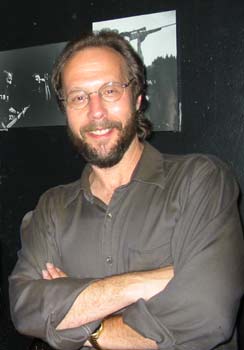 Jack Wessel has been Leon's bass player for over 20 years, now. He has
seen a
Jack Wessel has been Leon's bass player for over 20 years, now. He has
seen a
lot of changes in those years. It has been my pleasure to have exchanged
email with Jack over the past two+ years. Last month he kindly agreed to
let
me interview him via email. I hope you find his comments and recollections
as
interesting as I do.
A word of caution, this interview with Jack is my first and I know it
shows.
My apologies ahead of time to you, the reader, and to Jack for any typos
or
misquotes that might have crept in as a result of my attempts at editing
this
piece.
Note that ye olde editor has inserted some comments and annotations within
Jack's answers. These are identified by the "[" and "]" symbols.
- mergeop
[mergeop]: How did you get your start
as a professional musician and how did
you make your way to Leon's band?
[JW]: In the summer of 1972 after
my one and only year of college I went down
to Louisville to join the band of a Cleveland buddy of mine, Hank Linderman,
who had moved there, so that is, I suppose, when I went pro, or so I was
thinking.
My entry into the biz also included some table bussing, dishwashing, food
prep, fence construction, and lathe operation but most weekends I was in
show
business. I'd fully intended to return to school the next fall but guess
what? By the spring of '74 I found my first 6 night a week club gig and
I
proudly left day jobs behind. This stint was brief and when I left to join
another band I met and rehearsed my replacement, a young and new-in-town
John
Cowan.
John introduced me to his pal Tom Britt at that time. This had to be mere
months, maybe weeks before John joined NGR [New Grass Revival]. I seldom
saw
John after that but did bump into Tom now and then as he was playing with
a
very popular Kentucky band, the Cumberlands. The band I joined, Quickdraw,
became quite popular in Louisville and lasted till the summer of '81. By
then, of course, NGR had been with Leon for a couple of years and had lost
two original members. The Leon NGR of '81 was John and Sam Bush and also
included Tom Britt on guitar and steel.
John and Sam had found Bela Fleck and Pat Flynn and had given Leon notice.
I
never did ask or find out whether it was John or Tom who recommended me
for
the bass slot but it was Tom who called me, probably 20 years to this very
day, 8/8(?)/81. I had no idea Leon was in Nashville but it was a 3-hour
drive
in my Chevette so I braved the audition (another story) and don't you know
I
got the gig. I don't know if the rest is history but it's quite like my
history because today, most weekends, I'm in show business.
[mergeop]: Is the bass your instrument
of choice? What other instruments do
you play?
[JW]: I became a bass player by default,
like most bass players, I believe.
If one is the crappiest guitar player or has the crappiest guitar, one
becomes a bass player. At age 12 this may mean playing bass parts on the
bottom 2 strings of your crappy guitar until you can talk your dad into
buying you a crappy bass. I studied woodwinds from age 9 till 13 and was
once
a sight-reading son of a gun. I abandoned all training shortly after starting
up basement rock bands. I couldn't connect musical training with cool. I
can
now, but I was not the brightest boy. Today, save for a smattering of
keyboard for writing purposes, I play only bass. My guitar playing was always
strictly scrape and saw, the sort I always booed. Somewhere in my 20's I
did
us all a favor and put the guitar away.
[mergeop]: What happened at the audition
with Leon?
[JW]: I arrived at the Hendersonville
house about 15 minutes ahead of my
scheduled appointment and was met by Tom Britt who said Leon was still
downtown at Pete Drake's studio and would be running late. I was told to
hang
out in the kitchen and there I met Ambrose Campbell and Shamsi Sarumi.
After exchanging brief nice to meet yous I sat mute for the next hour
or so
while Ambrose and Shamsi conversed/shouted in their native tongue. Every
now
and then Tom would drop in to say Leon shouldn't be much longer.
I had no idea whether or not I was the only applicant scheduled that day
and
wondered who Leon was when he finally got there. I had never seen him in
person before and I expected a guy with waist length blonde hair. When I
saw
the guy with barely shoulder length white hair I thought it must be another
bass player.
He introduced himself and I enjoyed some small relief at not being a numbered
beast at a cattle call. I was led to the houseboat, the Lady Blue, docked
at
the lakeshore at the end of his back yard, quite a stroll. On the way down,
Leon explained that he was looking for somebody with good "pattern
recognition", as he didn't like to have to verbally instruct players through
every bar of a song. I didn't know what pattern recognition was but I said
"right, yeah, sure".
Assembled on board were Tom on guitar, Ambrose on gourd, and Shamsi on
conga
in the living room of the yacht, a pretty tight space with Leon and a Yamaha
electric grand in the center. Leon proceeded to kick off a series of
surprisingly simple blues changes and a variety of grooves, shuffles,
2-beats, half times, and such.
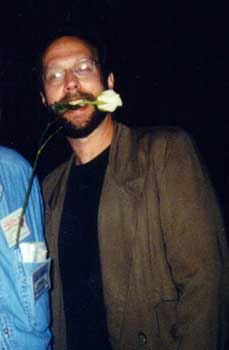 All the time I was clinging to my resolve not to freak no matter what.
I was
All the time I was clinging to my resolve not to freak no matter what.
I was
sure I had no business there or hope of getting the gig anyway. I had
nothing to lose but minutes of the experience should I crumble too soon.
Leon
asked me to sing something, I'm pretty sure I sang "Stagger Lee", I know
it
was a shuffle. Then he told me to sing harmony with him on "Yesterday".
I was
surprised at this; not knowing it was a regular number in the show.
I pulled that off and that was it. I'll be damned; he started hiring me.
He
said he had 8 or 9 more shows to do with NGR but invited me to join the
tour
and play second bass with John. That way I could learn the show and he
wouldn't have to rehearse me once he started hiring the next band. He gave
me
a show tape, which was a help but didn't include every song in the show.
That
was OK though, back then Leon was usually tossing out seldom played tunes
on
stage so the unknown was as important to expect as the known.
I have to say that my most vivid memory of the audition is of Ambrose's
piercing gaze fixed on me the whole time. I couldn't understand what he
was
looking at but later I was pretty sure he guided me. I was soon to learn
more
about this man.
[mergeop]: Leon's "Live at Gilley's"
CD was recorded on September 17, 1981.
That would put you in the band at that time. What were your early days in
the
band like?
[JW]: I was in fact on stage at the
recorded Gilley's show but was still a
trainee at the time and was usually way down in the mix. Ted [The Gilley's
CD
was mixed by Leon's son, Teddy Jack Bridges] said the track with my bass
on
it had tons of bleed from other instruments and was unusable and that's
fine
with me. So don't strain your ears for me on that record, I ain't there.
Also absent on that date was John "Juke" Logan, the great harmonica player
with Leon from '81 to '85 who for some reason didn't make that date.
As for my early days, after the very educational NGR play out Leon assembled
a much larger band that included drums, harmonica, violin, mandolin,
trombone(!), second keyboard, guitar, and steel. This lineup didn't last
long
but had a sound I'll never forget.
At this time, the bus was down and we were all out in cars, owned and
rented,
and somehow managed to show up in the correct town at the correct time.
I
still thought this was just rock and roll as all get out. Soon the old '65
Silver Eagle was back in service and I was inducted into bus life.
The lineup started changing, four female backup singers were added (yes,
at
one point I married one for several hours). Trombones and second keyboards
were gone. Leon traveled on his own motor home in this period and usually
turned up about 30 minutes before the show and was in the wind as soon as
it
was over. We didn't see much of him on the road back then save for show
time
but when the breaks between trips were short most of us hung out at the
Hendersonville house as hardly anybody in the band lived in Nashville at
the
time. I got dibs on the Lady Blue as my guest quarters as much as possible,
hey, rock star time.
When the bands were bigger the show was much more unpredictable. With
4 or 5
other soloists Leon could stretch songs in ways we don't see now and could
play the different personalities in the band off each other, which was
usually fun. Strange and unknown songs would occasionally arise and should
they crash and burn the sheer size and power of the band, along with Leon's
control, would have this easily forgiven. The shows were long, loud and
sweaty and were celebrated accordingly afterward in a way we wouldn't want
to
see now. Leon missed all of this but did enjoy hearing about it.
[mergeop]: Tom Britt's brother Bob
was also in the band, wasn't he?
[JW]: Yes, Tom Britt told Leon he
had a brother who played guitar and Leon,
being a fan of the family band, had 21 year old Bob smuggled in from Mexico
where he'd been held hostage with a show band.
What a find, Bob stayed for 9 years during which time he developed his
now
well known and unique style and also became a great recording engineer.
He's
currently musical director for the Dixie Chicks. Tom left the band in '82
and
went on to play with a slew of top shelf Nashville artists, most recently
Patty Loveless and Vince Gill.
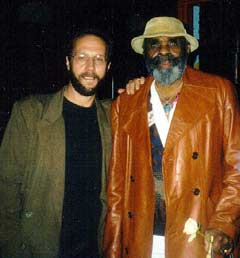 [mergeop]: Another multi-decade member
of the band is Ambrose Campbell. Until
[mergeop]: Another multi-decade member
of the band is Ambrose Campbell. Until
recently, I had thought he was "just" Leon's percussionist. What can you
tell
me about him?
[JW]: What can I tell you about Ambrose?
I can tell you that making his
acquaintance is possibly the most unique gift of this whole experience.
Anybody who wants to know about his life and music can probably learn more
from the links to him on your site than anywhere else, other than the man
himself. I recommend your Ambrose links to anyone who hasn't seen them yet.
[Link below]
I know that Leon met him in England in the early 70's and Ambrose came
to the
U.S. to tour with him in '72 and has lived here ever since.
He is an indelible presence in this band whether he's out with us or not.
He
was in and out of the band in the 80's and in '93 came out with Leon and
me
when we started the trio shows with just keyboard, bass, and gourd. When
the
road tired him after awhile, Ted [Teddy Jack] entered the picture, taking
over the gourd until '96 when drums returned.
Ambrose makes beautiful music you won't hear anywhere else and continues
to
do so to this day, recording at home.
Leon has told the story of visiting Lagos, Nigeria with Ambrose in 1980.
Entering the airport terminal upon arrival, armed guards, seeing Ambrose,
laid down their rifles and dropped to their knees till he passed. I don't
know the whole story behind this but I think it illustrates the power of
the
gentle man, two words.
By the way, I do believe Ambrose has a birthday this month. Happy birthday
Ambrose, we love you. [82 years young on August 19, 2001]
[mergeop]: How did the tours with
Edgar Winter come about and what were they
like?
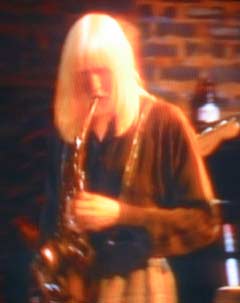 [JW]: I don't know when Leon and Edgar
first met but even in my first year it
[JW]: I don't know when Leon and Edgar
first met but even in my first year it
seemed we'd do a show with Edgar and his band from time to time. These
occasions weren't all that frequent but usually ended with the two visiting
and talking for a good while after the show.
At some point they started kicking around the idea of working together
in one
band which by June of '86 luckily turned out to be ours. This turned out
to
be a terrific experience and a favorite era for me.
Working with two great artists and bandleaders at one time is something
not
every player gets to do. Leon's style of band leading usually abandoned
the
record arrangements. He would approach the songs from the overall tone of
the
show he had in mind and players could more or less create their parts in
response to what he would play. He would then approve or correct what he
heard and the songs and show would take shape. Edgar would actually teach
the
parts on his songs to each player, which I think, helped to get the show
up
and running more smoothly.
This was a great show and I'm proud to have been a part of it. The show
went
to Brazil in '87 and the audience response was like nothing I'd ever
experienced. We went to Russia in '89 and the response was, well, pretty
darn
good for Russia when you're opening for La Toya Jackson.
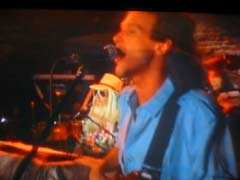 I have to say that Edgar is probably the most tireless and consistent
I have to say that Edgar is probably the most tireless and consistent
performer I've ever witnessed. A night is a night, his thing is his thing
and
he does it every time. He's also much like Leon in that he's very supportive
and generous with the spotlight to the other people on stage.
By '88 we had expanded the road crew a bit and this brought a more rock
and
roll tone to the road life. Leon and Edgar, of course, were nowhere around
for any after show whoopdidoo, but roadies will take care of their bands
and
this, fortunately, was the final era for any unreportable rock band
shenanigans. Edgar did his last show with us in October of '89 but still
sits
in with us to this day whenever we share a bill and it's always great to
see
him.
[mergeop]: In the early 90's Leon
signed with Virgin Records. What kind of
impact did signing with a major label have on the band? Did Virgin bring
in
Bruce Hornsby?
[JW]: Bruce Hornsby was instrumental
in the Virgin deal and became a
co-producer in the process. He and Leon had been in touch for a good while,
beginning around the time of a '90 Rolling Stone "Mentors" piece.
Work on "Anything Can Happen" probably began in late '90, continuing through
'91 and wrapping in early '92. As for the impact on the band, it created
one
as Leon had been working solo for a year and a half.
The Virgin band was a nine-piece unit with three additional keyboard players
and two percussionists, including Ambrose. Leon assigned each keyboard player
a specific role, one playing organ and synth, one piano and synth, and one
strings and horns. The orchestral effect of this four-keyboard section,
Leon,
Bob Ramsey, Damon Seale, and Howard Duck, made this a memorable band, the
last big one.
It lasted about as long as the Virgin deal and got pared down to a five
piece
by August for a handful of shows before Leon went solo. In early '93, the
trio period began with Leon, Ambrose, and myself. This was interrupted
briefly in April of '93 when the Virgin five piece, with Bob Ramsey, Mark
Lambert (guitar), Danny Darling (drums), myself and Leon toured Japan for
three weeks.
[mergeop]: Leon recorded two songs
for a tribute CD for the Japanese band,
Southern All Stars. The songs were: "I Feel the Echo" and "Until It's Gone"
which were on the Japanese CD, Midsummer Blossoms II. Weren't there some
unusual circumstances regarding those recordings?
[JW]: I'm pretty sure the hookup to
the Southern All Stars, a major Japanese
band, occurred when Leon went to Tokyo for three solo shows in '90. It was
Leon's first appearance in Japan since the early 70's and drew a good bit
of
attention. The All Stars were doing a "guest" album with invited artists
singing the band's best known songs.
I'm not sure, but I doubt Leon did these sessions in Japan. I think the
tracks were flown to Leon's home studio and he did the vocals there.
The "unusual requirements" you ask about probably refer to the high, reedy
sound of Leon's voice on " I Feel the Echo". Obviously, the track for this
rangy tune was cut in an unsuitable key so, when doing the vocals, the track
was slowed down a whole step or so on some sections, allowing Leon to insert
the more impossible notes in his own range. This is a common practice and
the
result is the uncharacteristically thin tenor of Leon's voice on this tune.
In '93 the five-piece show was asked to perform both of the All Stars'
songs
on the show. We did rehearse both songs but ended up dropping "Until It's
Gone" and doing "Echo" in Leon's key. "Echo" was actually the easier song
to
include in our show. I really like Japanese pop but it is more compositional
in nature then the pop-rock we know. This means "Until It's Gone" was too
long and had too many sections to work in a show like ours so we bagged
it.
Nevertheless, the '93 Japan tour was a gas, gas, gas as were the '95 and
'96
trips. I will continue to lobby and conspire to return to the Land of the
Rising Sun and Beer Machines.
[mergeop]: Occasionally, I'll get
questions from "fans" asking if Leon uses
pre-recorded music in his shows. For the record, what are these people
hearing?
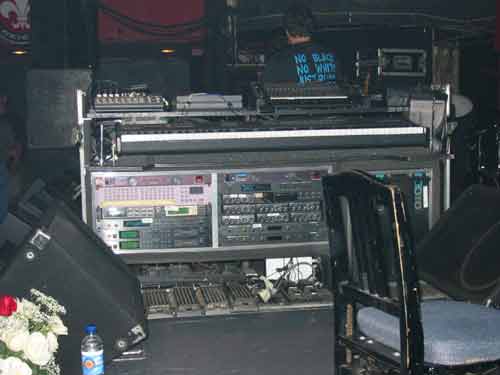 [JW]: The "questions" you get usually
come to us in the form of accusations
[JW]: The "questions" you get usually
come to us in the form of accusations
but "for the record", and as simply as I can explain it, Leon's keyboard
rig
uses a number of digital samples of various instruments, horns, strings,
percussion, etc. These are assigned to different regions of the keyboard.
On
the floor at Leon's feet is a bank of pedals that Leon uses to bring the
different sounds in and out at given points of a song. So what you hear
is
what Leon is actually playing in real time. There are no prerecorded
sequences.
I remember a time when using sequences on the show was discussed and
dismissed. The prospect of onstage technical failure of this sort was too
scary to commit to. Besides, our stage tempos are a very feely thing. Now,
our friend Edgar uses sequences to tremendous effect on his show as do lots
of folks but it's just not for us. So if there are still any doubters out
there, get up close and watch Leon's feet. And count 1,2,3,4...
[mergeop]: Leon Russell Records will
kick into high gear with three brand new
releases and 2 reissues in September. How does this compare to the activity
at Paradise Records in 1984?
[JW]: I think the obvious difference
is the more far-reaching ambition of
LRR. The presence of real record and PR people, Leon's prolific personal
output of material, and a diverse roster of artists don't make LRR at all
comparable to the '84 Paradise reactivation. Paradise came back in '84 to
get
"Solid State" and "Hank II" out and about. LRR is definitely a different
setup.
[mergeop]: Over the last two and a
half years, the Leon Russell mailing list
has been growing by leaps & bounds. Have you and the band noticed any
impact
from this group of Internet-ready, "Leon Lifers"?
[JW]: I know the Lifers have had a
huge impact on all of us. The very idea
of actually knowing who is there, where and how far they've come from to
be
there, and that they are sharing the ups or downs of a given night with
us
has given show time a new and improved mindset, and a lasting one.
I think this tangible awareness of his fans' support has given Leon a real
boost. I won't forget the way he charged down to the Doubletree in L'ville
last fall when he heard about the certified convention. Believe me, it was
as
unforgettable to me as any of you. I really can't adequately convey our
gratitude.
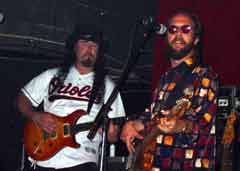
[mergeop]: What about the current
band line-up? What do all the "newbies"
bring to the band?
[JW]: Well, it's hard to think
of anyone in today's band as a newbie. Even
Sugaree has been with us since Nov. of '98. John [Johnny Lee Giles is Leon's
lead guitarist] has been here since Feb. of '98 and Ted has been here since
the fall of '93. He took over for Ambrose on gourd at that time and moved
to
drums in '96.
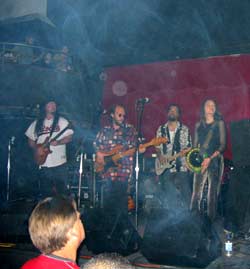 John brought the rewards of another bonified soloist to the show along with
John brought the rewards of another bonified soloist to the show along with
his ability to connect with the fans. Invaluable, he is. Check out his web
site. It's the most reliable and active source for tour date info. He reports
regularly from each of Leon's tours and he counts hits.
Ted has worn every hat thrown his way and has had a large role in
every
record made since his arrival. He's held the drum chair longer than anybody
in my time and he's a guitar player!
Sugaree [Leon's daughter], aside from obviously riveting attention to
her
square foot of stage space, is a veritable time machine on the gourd. A
percussionist who tires quickly and drops time can and will stop the band.
From the time of Ambrose's entrance the gourd has been an important component
of Leon's music. Sugi does Ambrose and her dad proud.
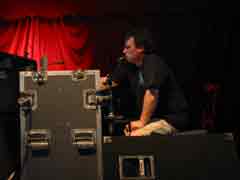 This has actually been the most stable unit of any of Leon's bands come
to
This has actually been the most stable unit of any of Leon's bands come
to
think of it. Our driver Grant Whitman has been here for 2 years and our
sound
man and RM, Jeff Hawkins, has been with us for 16 months and in that slot
that is certifiable tenure.
You know, there are a slew of names, band folk, I never mentioned in the
interest of brevity but since I failed that objective so miserably why not
call them off now? You don't mind? Hey, thanks.
Thank you, in chronological order: Chris Pritchard, Buster Phillips, Paul
Brewer, Jack Meyers, Jon Yudkin, Butch McDade, Marcia Wood, Pebble Daniel,
Trudy Fair, Do'Anna Cooper, Billy West, Kirby Shelsted, Herb Schucher, Joe
Turley, Flip Anderson, Jim Gunn, Dale Armstrong, Michael Salleem, Alex Torez,
and Ryan Kirwan. Nice jammin'wicha.
And thank you, Leon. I'm enjoying this. Glad to be here.
I also want to thank my wife Robin and my boys Jackson and Evan for letting
a
guy like me in and out of the house.
If I've forgotten anyone it's because I'm getting on now and as a friend
of
mine says, a mind is a terrible thing. - Jack
Reprinted from mergeop's Leon
Russell Newsletter , September 17, 2001.
Photo history/ownership.
- Jack Wessel photo taken by Mrs. mergeop in Newport, KY on June 21,
2002. Mr. mergeop was deemed inappropriate material and has been subsequently
edited out.
- Jack Wessel photo taken by Mrs. mergeop in Louisville, KY at Coyotes
on September 27, 2000.
- Jack Wessel and Ambrose Campbell photo taken by Mrs. mergeop in Louisville,
KY at Coyotes on September 27, 2000.
- Edgar Winter still from the Classic Pictures DVD: Edgar Winter Live
on Stage: Featuring Leon Russell.
- Leon Russell and Jack Wessel still from the Classic Pictures DVD:
Edgar Winter Live on Stage: Featuring Leon Russell.
- Leon's keyboard rig photo taken in Newport, KY on June 21, 2002 by
mergeop. Click on jpg for a larger view.
- Johnny Lee Giles and Jack Wessel. Ditto
- Johnny Lee Giles, Jack Wessel, Teddy Jack, and Sugaree photo. Ditto
- Jeff Hawkins photo. Ditto
Back to the top of this page
 Jack Wessel has been Leon's bass player for over 20 years, now. He has
seen a
Jack Wessel has been Leon's bass player for over 20 years, now. He has
seen a  All the time I was clinging to my resolve not to freak no matter what.
I was
All the time I was clinging to my resolve not to freak no matter what.
I was  [mergeop]: Another multi-decade member
of the band is Ambrose Campbell. Until
[mergeop]: Another multi-decade member
of the band is Ambrose Campbell. Until  [JW]: I don't know when Leon and Edgar
first met but even in my first year it
[JW]: I don't know when Leon and Edgar
first met but even in my first year it  I have to say that Edgar is probably the most tireless and consistent
I have to say that Edgar is probably the most tireless and consistent 

 John brought the rewards of another bonified soloist to the show along with
John brought the rewards of another bonified soloist to the show along with
 This has actually been the most stable unit of any of Leon's bands come
to
This has actually been the most stable unit of any of Leon's bands come
to